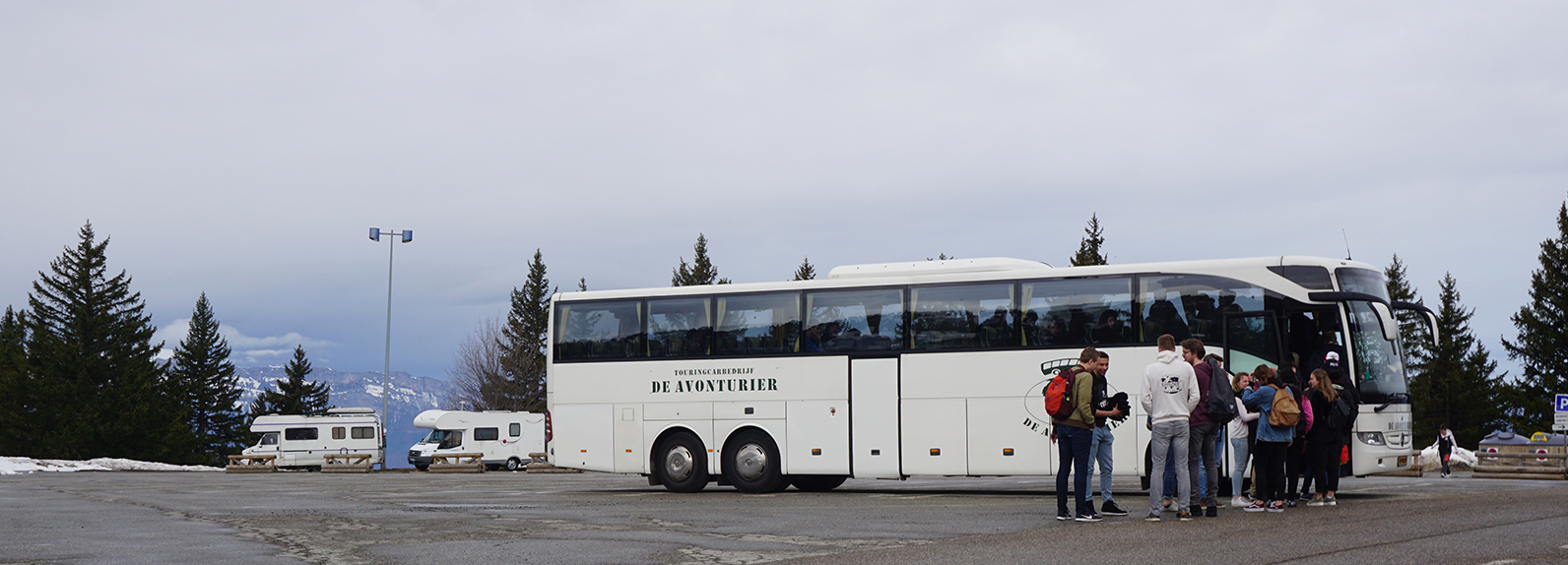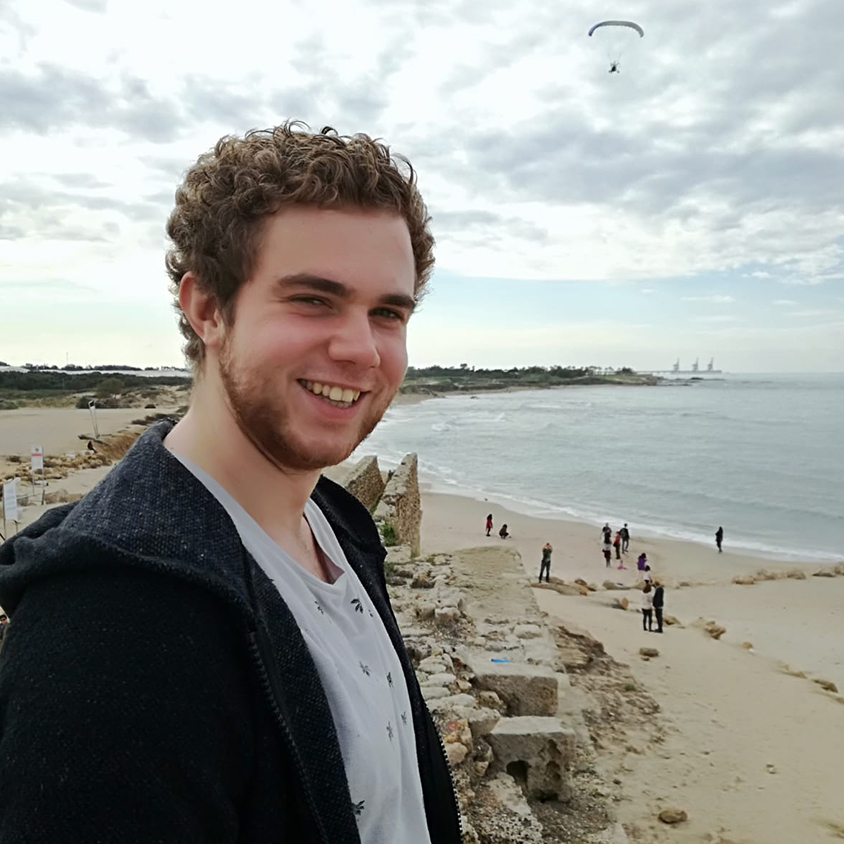Students and flight shame: ‘You're not flying to London, are you?'

A more conscious approach to mobility is a lively topic at Utrecht University. In November, the UU decided to cut the number of flight kilometres of employees in half. That does not happen with prohibitions, but with an awareness campaign and among other things the possibility to travel first class by train. For the time being, students will not be hampered. Nevertheless, students Levi, Megan and Wiger still feel appealed by the call to ignore aviation to a greater or lesser extent. Next to this, study associations also pay more attention when planning study trips to see whether flying is really necessary. To stimulate this behaviour, Green Office Utrecht has organised a competition to influence their travel behaviour (see box). Study association Storm, of the bachelor Global Sustainability Science and the masters Sustainable Development and Water Science & Management can already participate, because these students do not fly as a matter of principle. The study association of social geographers and planners say that they only fly once a year and Aegee, the primary student travel association of Utrecht, is searching diligently for ways to avoid flying.
Study association Storm chooses not to travel by plane as a matter of principle. They travel abroad by bus through Europe. Anne van Storm explains that she was "bombarded" with facts concerning the harmful effects of flying from day one of her Global Sustainability Science study. Choosing a bus trip sounds completely logical. “Moreover, we have had the same bus driver for ten years. He is truly a legend within our association and with him anything is allowed. We dance, jump and play games; our time on the bus is no less fun than being on location.”

Jeroen of the Study Association for Human geography & Planning says that his association consciously chooses to fly only once a year. “As geographers we find it very interesting to go to special places and these places can’t always be reached easily with alternative means of transport. This year we are going to Russia. If you choose such a distant destination, then you have to fly. We know that flying is not good, but we still want to make that one flight because we find such a trip of informative value”.
"In my opinion, Aegee has always been environmentally conscious," says Nora Zwierenberg, chair of the European student association. “We travel a lot, but try to be aware of sustainability.” Because Aegee has several departments in Europe, there is an event somewhere at least every weekend. "We make mutual agreements to ensure that members who go to the same event together choose an alternative instead of the plane."
Student Earth Sciences Wiger (23): 'Flight shame? I find it nonsense myself.'
 Do you ever fly?“Yes, for vacation. Southeast Asia has been the furthest destination. For closer destinations, such as Germany or England, I travel by train or car, but last year I flew to Dublin and Athens, both of which could not really be done by train.”
Do you ever fly?“Yes, for vacation. Southeast Asia has been the furthest destination. For closer destinations, such as Germany or England, I travel by train or car, but last year I flew to Dublin and Athens, both of which could not really be done by train.”
Is flying still responsible?
"Yes, I think so. How else would you want to cover large distances? Some people just have to travel great distances. If someone has to go to China for work, it's hard to put him on the train and have him arrive three weeks later.”
What do you think of people who condemn others for their flying behaviour?
“Well, mind your own business. I understand you can disagree with each other, but for a distant destination you just take the plane. You have to make that decision yourself. If people say, ‘Yes, but you fly, that's bad for the environment,’ I think, ‘Yes, but I still have to go there, you're out of luck’.”
“Oh no. Haha. I don't care at all. I can empathise with others with flight shame, and I understand why they suffer from it, but I find it nonsense myself. ”
If flying is suggested for your study trip, do you embark on the plane without shame?
“Yes, if they offer me that, I will just go with them, I won't sit on the train three times as long. Besides this, Earth sciences is a climate-conscious study, we do not deny the harmful effects of flying, but we do think: ‘what else should you do?’ I think we should just stay grounded.”
Although the association for human geography opts for a single flight, Jeroen explains that the theme of sustainability does play a role within his association and that they are actively working on it. “We have replaced paper cups with stone mugs, and we also offer vegetarian food. These are only small things, but it does help to become more aware of sustainability.”
Aegee also considers sustainability to be of paramount importance. The association has also set up a special committee to investigate how Aegee can become more sustainable. "We already did many things, such as waste separation. But because we are a travel association, the biggest impact is flying," explains Nora.
At Storm, the members keep each sharp. Anne explains that "If you say you are going to London, the response is: ‘Oh, but you are not flying, right?’”. The members seem to become stricter and more aware as their studies progress. “We motivate each other and occasionally make a joke when someone has flown. But we also understand that if you have known this freedom throughout your life to be able to go anywhere, it is not surprising that you cannot easily change that pattern in one year, ” she puts into perspective.
Do the Utrecht associations suffer from flight shame? “I think our members are particularly enthusiastic about the fact that we are going to Russia,” says Jeroen. “At our association, we strongly emphasise the awareness of sustainability. If one annual flight is a deliberate choice, and you do not deny that it is bad for the environment, there is less shame, in my opinion.” Nora doubts whether Aegee members suffer from flight shame. “I do think some members sometimes think:" Oh yes, stupid that I went by plane again, I could have gone by train”, but I would not call that shame”. Nevertheless, according to Nora there are also members who choose not to fly. “They still go with us on a trip, but then they take the train or another alternative.” Due to Aegee's European focus, the trips are limited to Europe, so an alternative is easier to find.
 Do you ever fly?
Do you ever fly?“Yes, last year I went to Scotland and Spain. My boyfriend and I first considered the train to Spain, but when we saw how long it took, it did not fit into our short holiday period. I went to Scotland with my mother; she is terrified of boat trips, so we opted for the plane. Every time I intend not to fly, but then it happens anyway. Of course it doesn't help if you only have short holiday periods.”
Is flying still responsible?
“Well, I often have problems with that. In my daily life I do my utmost to be environmentally friendly. I do not eat meat, I separate my waste and travel by train, but I still fly. One time on a plane, I feel, destroys my environmentally friendly behaviour. On the other hand, I think: those planes depart anyhow. It would be better if there were fewer planes, but I don't think you can change that as an individual.”
Do you suffer from flight shame?
"Certainly, I wouldn't put a photo on Instagram of the wing of an airplane easily, as if saying: ‘Look at me on an airplane’”.
What do you think of people who condemn others because they choose to fly?
“Well, I think they are right partially, but you also have to consider that the alternative option is often not that easy to obtain, as long as you only have a certain time period to travel and have a limited budget. That is why it makes sense that people choose to fly. It also fits very well in today's society to want to be somewhere fast. But I also understand that you condemn that.”
What would you like to say to people who condemn others about their flight behaviour?
“I don't really know. I would like to ask them what they would like to do themselves to change it, and whether it is right to condemn the individual. I rather think that it is an institutional problem and that something must be done about that.”
How do the associations deal with people who condemn others for their flying behaviour? Jeroen says that the human geographers are not judged for their trip by plane. “We also recognise that flying is not good. The people around us mainly react with: "How awesome, how cool", when we told them that we are going to Russia.” Still, Jeroen would like to have a conversation with the people who condemn the flying trip. “I would explain to them why we came to this decision, and that it was a conscious choice.”
Nora finds it hard to imagine what she thinks of people who condemn others for their flying behaviour. “You can condemn people for it, but I don't think you achieve anything like that. I have the feeling that people don't listen to you doing it that way. You could better offer a helping hand, such as: ‘Hey, what if you do it this way?’ Then you get a more positive outcome.”
Now that Anne is on the Storm board, she is consciously told how other study associations are approaching their trips. She says that she finds it a bit shocking that some study associations opt for a foreign flight. “Also, because sometimes it is only for a few days. At our association it is so normal to think carefully about the impact of flying. But I do understand that if you don't know how harmful flying is, you can't be consciously involved with it.”
Even so, Anne does not see it as a solution to condemn others for their flying behaviour. “I am an advocate of offering an alternative and showing how fun and easy that alternative can be.” However, she is all too aware of the fact that there is not always an alternative available. “The market is simply not designed to make train journeys fun. Now, only flying is fun. We really have to continue to insist on expanding the train network, that is really necessary.”
 Do you ever fly?
Do you ever fly?“Yes, in recent years I have flown a number of times to go on holidays. The last flight I made was to Vietnam in 2018, which was also the farthest flight I have ever made.”
Why do you travel by plane?
“Well, it's super cheap, easy and you get to your destination quickly. I find it a very relaxed way to travel. "
How many times have you flown in the past year?
“Last year I did not travel by plane, because I became more aware that flying is really bad, especially when it comes to the carbon footprint you leave behind. If I want to make a journey within Europe now, I only allow myself to go by train.”
So you think flying is no longer responsible?
“Irresponsible is a big word for me. I think we can handle flying more consciously. I understand that there is a need to occasionally leave, but I doubt whether I think going by plane constantly is ethically responsible. Still, I understand why people in the winter want to go somewhere where the sun shines.”
Do you suffer from flight shame?
“Yes, maybe a little bit. That I did not fly last year is somewhat the result of flight shame. Now, I long for a journey far away again, and I don't think I can satisfy that need with a train journey to Spain or Italy. That’s frustrating.”
Utrecht University calculated that around 26 percent of their ecological footprint consists of mobility. Now that it is actively reducing the number of flight kilometres, the Green Office sees this as the perfect moment to help study associations look more critically at their own choices in the field of transport. Through the “Our Big Fat Green project”, the Green Office offers help to opt for more sustainable travel methods. They also offer a prize of 500 euros for the most sustainable study association. The Green Office will publish a ranking and announce the winner in February. Curious about the project? Read more about it here.